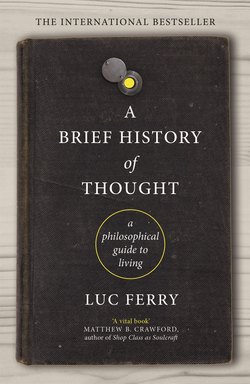Читать книгу A Brief History of Thought - Luc Ferry - Страница 9
На сайте Литреса книга снята с продажи.
WHAT IS PHILOSOPHY?
ОглавлениеI am going to tell you the story as well as the history of philosophy. Not all of it, of course, but its five great moments. In each case, I will give you an example of one or two transforming visions of the world or, as we say sometimes, one or two great ‘systems of thought’. I promise that, if you take the trouble to follow me, you will come to understand this thing called philosophy and you will have the means to investigate it further – for example, by reading in detail some of the great thinkers of whom I shall be speaking.
The question ‘What is philosophy?’ is unfortunately one of the most controversial (although in a sense that is a good thing, because we are forced to exercise our ability to reason) and one which the majority of philosophers still debate today, without finding common ground.
When I was in my final year at school, my teacher assured me that it referred ‘quite simply’ to the ‘formation of a critical and independent spirit’, to a ‘method of rigorous thought’, to an ‘art of reflection’, rooted in an attitude of ‘astonishment’ and ‘enquiry’ … These are the definitions which you still find today in most introductory works. However, in spite of the respect I have for my teacher, I must tell you from the start that, in my view, such definitions have nothing to do with the question.
It is certainly preferable to approach philosophy in a reflective spirit; that much is true. And that one should do so with rigour and even in a critical and interrogatory mood – that is also true. But all of these definitions are entirely non-specific. I’m sure that you can think of an infinite number of other human activities about which we should also ask questions and strive to argue our way as best we can, without their being in the slightest sense philosophical.
Biologists and artists, doctors and novelists, mathematicians and theologians, journalists and even politicians all reflect and ask themselves questions – none of which makes them, for my money, philosophers. One of the principal errors of the contemporary world is to reduce philosophy to a straightforward matter of ‘critical reflection’. Reflection and argument are worthy activities; they are indispensable to the formation of good citizens and allow us to participate in civic life with an independent spirit. But these are merely the means to an end – and philosophy is no more an instrument of politics than it is a prop for morality.
I suggest that we accept a different approach to the question ‘What is philosophy?’ and start from a very simple proposition, one that contains the central question of all philosophy: that the human being, as distinct from God, is mortal or, to speak like the philosophers, is a ‘finite being’, limited in space and time. As distinct from animals, moreover, a human being is the only creature who is aware of his limits. He knows that he will die, and that his near ones, those he loves, will also die. Consequently he cannot prevent himself from thinking about this state of affairs, which is disturbing and absurd, almost unimaginable. And, naturally enough, he is inclined to turn first of all to those religions which promise ‘salvation’.
